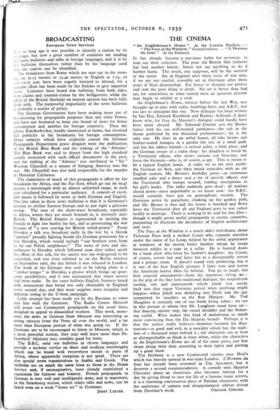THE CINEMA
" An Englishman's Home." At the London Pavilion.- " The Face at the Window." General release. --" L 'Homme du Jour." At the Embassy.
It has already become a war-time habit for reviewers to iron out their criticism. The poor old British film industry has had another knock: better not say anything to do it further harm. The result, one supposes, will be the survival of the worst. Art in England after three years of war may if we are not careful, resemble art in Germany after three years of Nazi dictatorship. Far better to sharpen our pencils and stab the poor thing to death. No art is better than bad art, for somewhere in some ruined barn an ignorant peasant may begin to whittle at a stick.
An Englishman's Home, written before the last War, was brought up to date with radio, bombing fleets and A.R.P., just too late to anticipate this one. New dialogue has been written by Ian Hay, Edward Knoblock and Rodney Ackland—I don't know why, for Guy du Maurier's dialogue could hardly have been more absurd. Mr. Edmund Gwenn acts the Brown father with his too well-trained pawkiness—the sob in the throat perfected by ten thousand performances ; he is the only star. He lives in an awful house, all fake beams and leather-seated lounges, in a garden the size of a small park. and has the oddest friends—a retired sailor, a little piece, and the German owner of a radio shop: his daughter is loved by a Territorial officer, who wears curious cad breeches, and loves the German—who is, of course, a spy. This is meant to be a typical English home. A radio set in the attic guides the German air fleet, and their attack coincides with an old English custom, Mr. Brown's birthday party—an enormous candled cake and a dance and a lot of aircraft officers ana the Territorial who snoops around, reading inscriptions in his girl's books. The radio suddenly goes dead : all stations closed down—most improbable as we know now: the B.B.C. would certainly have put on gramophone records. The Germans arrive by parachute, clanking up the garden path, and Mr. Brown is shot and the house is bombed and Betty loves the Territorial after all and England goes to war rather tardily in montage. There is nothing to be said for this film— though it might prove useful propaganda in enemy countries. purporting to illustrate the decadence of English architecture and taste.
The Face at the Window is a much older melodrama about Victorian Paris with a wicked Count who commits murders under the name of Le Loup, helped by the awful appearance at windows of his moron foster brother whom he keeps between whiles in a cage in a cellar. He is hunted down by a bank clerk who loves his banker's daughter: the Count, of course, covets her and lures her to a disreputable tavern and a private room. It doesn't sound very promising, but it is one of the best English pictures I have seen and leaves the American horror films far behind. You go to laugh, but find yourself immediately—from the ingenious titling en— in the grip of the fine firm traditional dialogue, the magnificent casting, sets and camerawork which plank you surely back into that vague Victorian period when anything might happen—when Jekyll was shrinking into Hyde and the ape committed its murders in the Rue Morgue. Mr. Tod Slaughter is certainly one of our finest living actors: we see in this picture at whose feet Mr. Laughton must have sat— that dancing sinister step, the raised shoulder and the flicker- ing eyelid. What makes this kind of melodrama so much more convincing than the Du Maurier brand? Perhaps it is that the author really believes—however fantastic his illus- trations—in good and evil, in a morality which has the tradi- tion of a thousand years behind it ; the characters are at least as distinguishable as black is from white, while the characters in An Englishman's Home are all of the same piece, just fine chaps doing their duty according to their lights and putting up a good show.
The Embassy is a new Continental cinema near Heal's which has bravely opened in war-time London. L'Homme du Jour has already been reviewed in The Spectator, but it deserves a second recommendation. A comedy with Maurice Chevalier about an electrician who becomes famous for a day by giving blood to save the life of a famous tragic actress, it is a charming conversation piece of Parisian characters, with the undertone of sadness and disappointment seldom absent


































 Previous page
Previous page